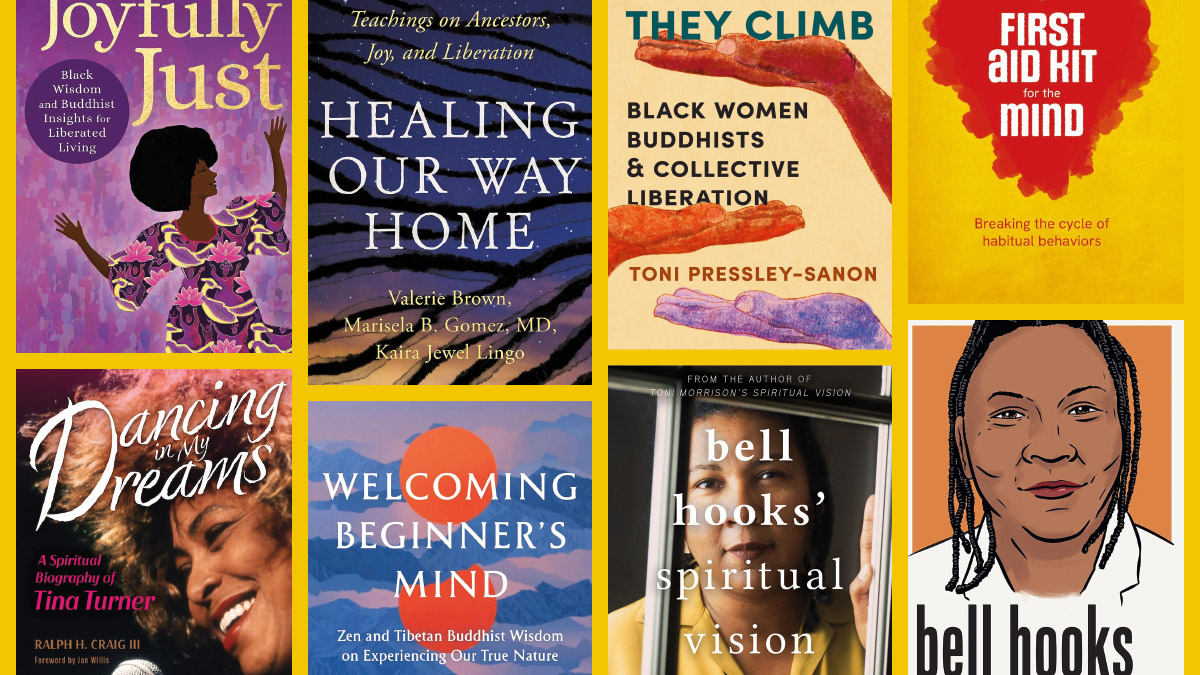Dr. Kamilah Majied’s Joyfully Just: Black Wisdom and Buddhist Insights for Liberated Living (Sounds True) invites us to exercise playful curiosity. The book’s expansive embrace of contemplative practices supports wellness and justice for people from all spiritual traditions and cultural backgrounds. “Well minds nurture justice and just minds nurture wellness,” Majied writes. Drawing deeply on Buddhist teachings and Black creative expression, Majied guides us on a path for how to reclaim and engage with a holistic joy, one that recognizes and integrates the realities of suffering, but then flowers in unique expressions as we fully embrace our culture. This book is Majied’s invitation for us to embark on a transformative quest, one that can elevate our consciousness, deepen our resilience, and prepare us to participate in the emergence of a world that is freer, more joyful, and more just.
Healing Our Way Home: Black Buddhist Teachings on Ancestors, Joy, and Liberation (Parallax Press) is a unique “trialogue” between Black Plum Village dharma teachers Valerie Brown, Marisela B. Gomez, MD, and Kaira Jewel Lingo. Though Brown, Gomez, and Lingo share lineage, teacher status, gender, and culture (in varying degrees), their individual lived experiences and complex perspectives add to the many twists and turns found in this book. Integrating Black intellectual thought into the dharma, they cite bell hooks, Cornel West, Malidoma Patrice Somé, angel Kyodo williams, Lama Rod Owens, Jasmine Syedullah, and more as influences. One of the most remarkable features of this book is the trialogue’s developing friendship and appreciation for each other. The speakers model respectful communication, displaying curiosity despite their familiarity, while avoiding feigning familiarity about experiences that are not shared. This book illustrates that making any sangha a deep well of refuge requires dedicated spiritual friends.
In Lifting as They Climb: Black Women Buddhists & Collective Liberation (Shambhala Publications), Toni Pressley-Sanon celebrates six phenomenal Black women who have elevated and expanded the Buddhist tradition. Writing, “I am a witness to their scars,” Pressley-Sanon explores the autobiographical writings of Jan Willis, bell hooks, Zenju Earthlyn Manuel, angel Kyoto williams, Spring Washam, and Faith Adiele. Invoking the intimate practice of self-revelation, each woman’s story unapologetically “speaks to the importance of centering one’s personal experience as part of a commitment to collective liberation.” These women transmute their personal pain and expand their personal power by drawing on a broad spectrum of spiritual traditions and practices including Christianity, shamanism, activism and organizing, divination, African and Indigenous beliefs, animism, and embodied practice. This book is a cornucopia that lifts up the stories and embodied teachings of Black women who are illuminating liberatory ways of being that dharma practice makes possible for all.
Trauma-informed Buddhist teacher Valerie Mason-John’s First Aid Kit for the Mind: Breaking the Cycle of Habitual Behaviors (Windhorse Publications) is a book centered on mind-body practice, which asks, “What should we do when we are hurting?” Mason-John demonstrates how to come home to our bodies both when we’re distressed and when we are at ease, so that we can have our own emergency medical technician of the mind to help us identify and work through the shame we feel when what we’ve tried in life hasn’t worked. Drawing on Buddhism, mindfulness, the performing arts, psychology, and physiology, they use mnemonics to help readers remember the practice. This short book offers more than a Band-Aid approach to covering over a scar; it is a tool for self-diagnosis and a salve for the weary-hearted.
Rock star Tina Turner, one of the world’s most famous practitioners of Nichiren Buddhism, described chanting the daimoku (Nam-myoho-renge-kyo) as life-changing. Her dramatic story of personal transformation is told by Ralph H. Craig III in Dancing in My Dreams: A Spiritual Biography of Tina Turner (Eerdmans). This ambitious account draws on media profiles, interviews, articles, documentaries, and earlier biographies of Turner’s life, while also situating Turner’s spiritual journey within broader understandings of American metaphysical religion and African American religious history. Documenting what Craig calls “Turner’s combinatory religious repertoire,” this book travels from the Black Southern Christianity of Turner’s family home and the spiritual naturalism of her maternal grandmother, through the parlors of European psychics and astrologers, and into the hidden guest rooms, dressings rooms, and stadium concert stages where Turner eventually practiced her Buddhist faith. Dancing in My Dreams is a tribute to the opportunities for rebirth, which are born of impermanence.
“Welcoming is our true nature,” writes Gaylon Ferguson in Welcoming Beginner’s Mind: Zen and Tibetan Buddhist Wisdom on Experiencing Our True Nature (Shambhala Publications). Continuing in the tradition of masters Shunryu Suzuki Roshi and Chögyam Trungpa, Ferguson offers an experiential guide for spiritual development. He invites us into deep reflections on Zen’s ancient ox-herding pictures, which show the stages of a practitioner’s progress toward enlightenment. Using clear and accessible prose, he discusses each image from “Seeking the Ox” to “Being in the World.” In order to cultivate the ground of our understanding of the path, Ferguson also provides an iterative exercise of welcoming practice at the end of each chapter. A generous offering of rich reflection and easeful practice, this book invites us to enter into intimate exchange and to inhabit the spacious meadow that is the direct experience of our true nature.
In bell hooks’ Spiritual Vision: Buddhist, Christian, and Feminist (Fortress Press), award-winning journalist Nadra Nittle offers both the novice reader and the longtime enthusiast unique insight into the people and personal struggles that influenced the spiritual development of well-known feminist scholar bell hooks. Nittle quilts together formative stories from hooks’ life, guiding readers on a journey through her explorations and critiques of Christianity, Buddhism, and other approaches to spirituality. Broadly surveying hooks’ writings and celebrating the popularity of All About Love following hooks’ death in 2021, Nittle traces the evolution of the deeply integrative spiritual approach that ultimately rooted hooks in the “transformative power of love,” and by which hooks asserted love’s essential role in countering interlocking systems of oppression. We come to understand bell hooks as a powerful woman of faith who reimagined more liberatory approaches to healing, self-realization, spirituality, and relationships, and we learn why hooks ultimately came to view all her offerings, personal and professional, as spiritual work.
In the beautifully curated collection bell hooks: The Last Interview and Other Conversations (Melville House), we witness bell hooks’ creative and intellectual brilliance through her conversations with seven writers and editors. We discover hooks’ reflections on race and feminism, Buddhism, popular culture, love and relationships, political and patriarchal domination, and on the primacy of place and the Appalachian values that made her. In these interviews, which span thirty years, we learn how hooks challenged material definitions of success, pushing beyond academic, feminist, and spiritual theories to elevate the immediacy and relevance of lived experience. She called for practical tools that “give people strategies in everyday life for justice” and that expand our individual and collective capacities for self-determination. Through these dialogues, we see hooks integrating personal narrative, engaging in self-critique, and sacrificing notions of privacy for the higher purposes of collective progress and collaborative exchange. “Revolution must begin with the self, she wrote, “but it has to be united with some kind of social vision.”

